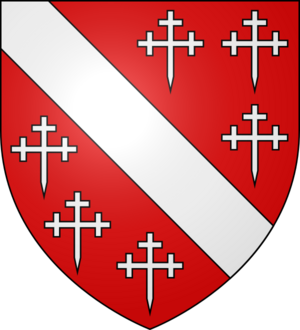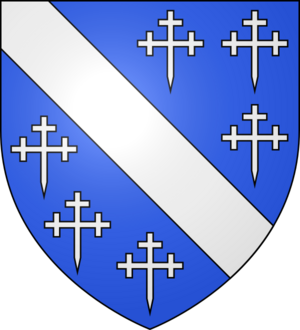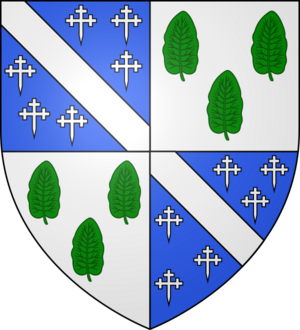Clan Cheyne facts for kids
Quick facts for kids Clan Cheyne |
|||
|---|---|---|---|
| Motto | Patientia Vincit (Patience conquers) | ||
| Profile | |||
| District | Aberdeenshire, Caithness and Sutherland | ||
| Clan Cheyne has no chief, and is an armigerous clan | |||
| Historic seat | Esslemont Castle, Aberdeenshire | ||
|
|||
|
|||
|
|||
Clan Cheyne is a Scottish clan with a long history. Even though it's officially recognized, the clan doesn't have a chief recognized by the Court of the Lord Lyon right now. This means it's considered an Armigerous clan. The name Cheyne is also seen as a special part, or sept, of Clan Sutherland. The Clan Sutherland Society in Scotland agrees with this connection.
Contents
The Story of Clan Cheyne
What Does "Cheyne" Mean?
The name Cheyne is very old. Experts think it might come from Norman or French words. It probably means "Oak Plantation," like a place where many oak trees grow. Some old writers mistakenly thought the name meant "dog" instead of "oak."
Early Beginnings of the Clan
The name Cheyne first appeared in records around 1158. A person named Ricardus de Chanai was mentioned then. The earliest record in Scotland is from about 1200. A man named William de Chense was noted in a document by William the Lion, a Scottish king.
Later, from 1267 to 1269, Sir Reginald le Chain was a very important person. He was the Great Chamberlain of Scotland. This meant he managed the king's money and lands. He owned large areas of land, including Inverugie and estates in Caithness.
Fighting for Scottish Freedom
In 1320, another Sir Reginald was important in Scottish history. He signed the Declaration of Arbroath. This famous letter asked the Pope to recognize Scotland's independence from England. It was a big moment for Scotland's freedom.
A Family Story from the 1300s
There's an interesting story about Sir Reginald le Chain, who lived until about 1345. He was known as a great hunter. He really wanted a son to inherit his lands. But his wife had two daughters.
The story says that as years passed, and no son was born, Sir Reginald saw two beautiful young ladies at a festival. He told his wife how much he admired them. He also shared his sadness about not having a son, and how he wished his own daughters, if they had lived, would be like these two. His wife then surprised him by introducing the two girls. She confessed that they were actually his own daughters, whom she had secretly saved. Sir Reginald was overjoyed and recognized them as his heirs.
One of these daughters, Marjory, married Nicholas Sutherland, 1st of Duffus. He was from a branch of the Clan Sutherland. Because of this marriage, the Cheyne name is seen as a sept (a family connected to a larger clan) of the Clan Sutherland.
Trouble at Esslemont Castle
In the 1500s, the Cheyne's home, Esslemont Castle, was damaged. This happened after a disagreement, or feud, with the Clan Hay.
Famous Cheyne Clansmen
Sir William Cheyne (who passed away in 1932) was a very important surgeon and scientist. He was a pioneer in using antiseptic methods during surgery in Britain. This helped make operations much safer.
Clan Cheyne Castles
The Clan Cheyne owned several castles over the years. These strongholds were important homes and defenses.
- Inverugie Castle, in Aberdeenshire, was held by the Cheynes from the 1200s.
- Esslemont Castle, also in Aberdeenshire, was a Cheyne home until 1625.
- Pitfitchie Castle, in Aberdeenshire.
- Ackergill Tower, in Caithness, was a Cheyne castle until it went to the Clan Keith in 1350.
- Berriedale Castle, in Berriedale, Highland, Caithness, was held by the Cheynes before it passed to the Clan Sutherland.
- Straloch Castle, in New Machar, Aberdeenshire.
See also
 | Laphonza Butler |
 | Daisy Bates |
 | Elizabeth Piper Ensley |




